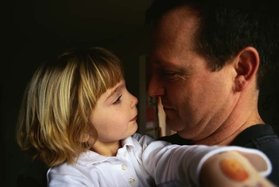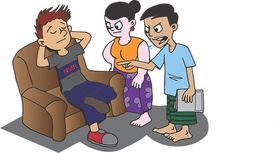 The Flip Side of Teachable Moments In my book, Teachable Moments: Building Blocks of Christian Parenting, I spend a lot of time encouraging parents to create teachable moments for your kids. Such moments are generally an “aha” moment for your child, you know, when they get it. It’s new information they acquire from you or from the circumstances, a life lesson, if you will. There are three kinds of teachable moments. The most fun ones come when there is no problem. You are sharing a magic moment with your child and both of you are the better for it. Jim and Jason are riding in the car and it begins to snow. Six year old Jason is fascinated by the snowflakes hitting the windshield. “Wow! There are like a million of them, Dad.” Jim glances over to his transfixed son. “That’s right, son, and each is different from the others. Each is a unique creation from God.” Jason cocks his head as he looks back at his dad. Dad continues, “That’s what snowflakes and humans have in common. Each is created individually. Each is unique. Each is from God.” Jason paused for just a moment, and then turned again to look at the snowflakes outside. A spontaneous teachable moment. After getting back from the store, Jim gets Jason started on his homework. While getting supper ready, he hears Jason erupt, “Arrgh. This math is stupid,” and Jason swipes his book and math problem sheet off his desk. Jim turns the heat down on the frying pan and finds Jason in his bedroom. “Homework kicking your butt?” He walks to his son’s side and puts a comforting arm around him. “I can’t do it,” Jason screams, “and you can’t make me.” If his dad chooses power, he might be offended by Jason’s show of disrespect and lose a teachable moment. Instead, he chooses empathy and active listens Jason’s feelings. “Wow! You’re really upset. It’s hard when you are learning something new and it doesn’t come to you naturally.” Jason noticeably calms down and slumps his shoulders. Dad continues, “I’ve got some ideas for you. Do you want to hear them?” Another teachable moment evolves from his calming his son down and getting back to task. The third kind of teachable moment is rarely acknowledged. These occur not from circumstances and not from when your child has a problem. These occur when you have a problem with your child. After Jason and his dad figure out his homework and he finishes it, his 4 year old sister comes into his room. “Get out, Emily. I don’t want you here in my room,” he shouts, and then pushes her down. Emily’s cries bring Jim running. Her dad scoops her up and stares down his son. While comforting his daughter, Jim asks Jason, “Care to explain?” “She was bothering me,” Jason countered. Jim paused to collect his thoughts and chose this to be another teachable moment for Jason. “So, Emily was bothering you and you chose to shout at her and push her down.” Jim let Emily down and directed her to go play in her room and that he would be there shortly. “Son, this isn’t like you. What else is going on?” Jason expected to be yelled at but puzzled instead. He began to explain his actions, while his dad active listened. When Jason was finished, dad asked, “Could there be other ways you could have handled your feelings better?” Jason fell silent. Dad added, “Tell you what. Just climb on your bed for a while and lay there. No toys, no books, no electronics. I want you to think about other ways you could have handled your feelings and how you could have avoided hurting your sister. I’m going to tend to Emily and I’ll be back in a while to hear what you’ve come up with.” While magic times and calming times are two sources of teachable moments with your child, confronting times is the flip side of teachable moments. All promote healthy relationship and creative problem-solving.
0 Comments
 “But I want it,” little 3 yr. old Andy demanded, stomping his feet for emphasis. “Gimme right now.” “That’s enough, young man,” huffed his mom, with hands on hips. “What part of ‘no’ didn’t you understand?” Andy darted past his mom in the kitchen, sweeping loose objects off the kitchen table as he went. He screamed, running through the house, catching his breath only to declare loudly, “You’re so mean.”… “You’re not my mommy.”… “I don’t love you anymore.” Andy’s behavior is unacceptable, and he is out of control. Mom pulled the power and authority card, but this time to no avail. Now what do you do? Even in the most stable, best of homes and environments, tantrum behavior from some children is inevitable. Sometimes it is embarrassing, especially when thrown with company around or in a public place, like the supermarket. Always, it is challenging when you child is demonstrating out-of-control behavior. When your power and authority falls flat, shift your focus from your authority to his feelings. Active listening is the go-to tool whenever your child demonstrates an emotional fever. Tantrum behavior counts. Sometimes, thankfully rarely, some children up the ante by demonstrating safety or property issues. If they are in danger of harming themselves, you, or others, and if they start randomly throwing and breaking things, you might use what’s called a nurturing/holding procedure, or NHP. The NHP is a physical restraint of your child against his will, with your assurance that you will only control him until he can control himself. Get ready. Kids will resist and attempt to get loose or turn on you by biting, kicking, pinching, and the like. Hold him from behind, with your legs wrapped around his and your arms covering his. Keep your head back, to avoid his head-butting you. As calmly and with soothing voice as possible, tell him, “Sweetheart, I’m so sorry you are having such a bad time. Right now, you can’t control yourself. Ya know what? I’m going to continue controlling you so that you don’t hurt yourself, me, others, or break things. I love you so much that I’m going to do this for you as long as I need to. As soon as you show me you’ve calmed down and regained your control, I’ll let you go. When your child realizes he can’t get loose, and you mean what you say, he will calm himself down. As you see measures of this, acknowledge them with assurances. Often, when this norm is established, all parents need to do subsequently is ask, “Now, Andy, do I need to hold you tight again?” Their memory kicks in and they calm down. After calming himself down, even a tantrum can become a teachable moment.  As parents, we do a lot of directing, instructing, and correcting with our children. It comes with the territory. But, my question to you today is this. Are you also grateful for your child and do you affirm him? All of these qualities can lead to teachable moments. Twelve year old Buck lived up to his nickname. Being Henry, Jr. just didn’t cut it, so his folks went with Buck. Boy, did his nickname ring true. He seemed to try to buck all the rules. “Buck, I showed you how I wanted the icing on the cookies. Why are you doing it differently?” asked his mama while they were preparing cookies to the party. “I don’t know,” pondered Buck. “I just wanted to try it this way.” Now, mama has a choice. She can assert her rightful parental authority by telling Buck to start over and ice the cookies the way she had told him. Even saying it nicely would lead her to direct, instruct, and correct her son. Or, she could think, “It’s only cookies. How they look is not the point.” This thinking might lead her to be grateful for Buck’s help on the project and to affirm his creativity in adding his own touch. The mindful parent is aware of both her own needs and feelings, as well as those of her child in the moment. When you look for the bigger picture, you may capture a teachable moment. Mama saw Buck’s tentative look, like he expected to be scolded for doing something wrong. “You know,” she decided how to handle the situation, “there are lots of ways to decorate cookies. No right way.” She reached over to hug her son, even as he jokingly tried to pull away. “I like your creativity. It’s your personal touch on the cookies. Good for you.” Buck lit up and beamed, as he went back to icing the cookies. Are you grateful for your child’s efforts, even if they are different than expected? Are you affirming his individuality and creativity? You are creating teachable moments he will remember forever.  Mr. Adams heard a crash in the next room and got up to investigate. As he got to the door, he caught a look from his 10 year old son, Alex. “Boy! What did you do?” he bellowed. “It was an accident. I was going to watch TV and just touched it for a second as I came around the couch, Papa.” His dad began to take his belt out from the loops in his pants, steam seemingly swirling up from his ears. Alex began to back away and he started to cry. “Papa, it was an accident.” “All accidents are preventable, Son. You weren’t careful.” Alex got to the door to the back yard and paused. He looked back at his angry dad approaching him. “Don’t you run from me, boy. You’ll just get more licks if you do. Take your punishment and learn your lesson. Be more careful.” Alex thought a moment and retreated back into the room, resigned to the licking. I hope that is not a scene from the story unfolding in your house. Alex’ dad chose to parent by fear and power, under the guise of teaching his son a lesson in being more careful. But who benefitted from this punishment? Not Alex. Oh, Alex may have chosen to be more careful in the future, to avoid another beating. But that’s not a teachable moment. That’s survival. A mindful parent, whose focus is on relationship, as well as accountability, would have handled this situation differently. Mr. Adams heard a crash in the next room and got up to investigate. He found his son, Alex, standing over a broken vase on the floor. “What happened, Son?” “It was an accident, Dad.” “You didn’t mean to knock the vase off the table?” “No, of course not.” “Okay, what needs to be done now?” Dad then got a dust mop and a broom from the closet and handed them to Alex. As Alex cleaned up the mess, Dad noted that the vase needed to be replaced and asked how that was going to happen. He also noted that the vase was his mom’s favorite, in that it came from grandma’s home and matched the room’s décor so well. Alex and his dad agreed to dig into Alex’ savings account and dad would take him to the store to find a replacement vase. When mom got home that evening, Alex agreed to explain to her what happened, present her with the replacement vase, and apologize for his carelessness. That series of natural consequences not only captures a teachable moment between dad and Alex, it is way better than punishment.  God’s marching orders to parents come in Proverbs 22:6. There, He tells us to “raise your children in the ways of the Lord so that, when they grow old, He will not depart from them.” A popular version of Scripture elsewhere cautions us not to “spare the rod and spoil the child.” So, my question to you is this. Is your parenting style power-oriented or relationship-oriented.? “My kid toes the line,” one parent told me gruffly. “If he doesn’t, I smack him. That’s what God says to do.” “Well, Joe,” I responded, “That’s one way of looking at it. But tell me, how’s that working for you and your son?” The rod can be a source of discipline in the home, but the outcome for your child is fear. Fear of being punished is a deterrent to being bad, but do you want your child to fear you? What about his behavior, choices, and relationship does your child learn from a good whipping? If you are choosing physical punishment for your child’s misbehavior, never whip him while you are angry. Give both of you a time out of up to 30 minutes before the punishment, so that you can calm down. Some parents say, “You know, son, this is going to hurt me more than it hurts you.” While such comment might help you feel less guilty, your child still feels the sting of the whipping. When you choose power, it most likely comes at the expense of relationship. I choose relationship. “Joey, what in the world were you thinking? Go to your room and think about what you did, and how you could have avoided this trouble by choosing something different. I’ll be by to talk to you in 30 minutes.” When you talk with him, use your active listening to understand his feelings and actions. Prompt him to discover other, healthier options to his bad behavior. Find a natural consequence, rather than punishment, that fits the crime. Hitting your son because he hit your daughter just teaches him about payback. Having him apologize to her and do her chores for a week teaches him that actions have consequences. Instead of a whipping, where everybody feels bad, you have the opportunity for a teachable moment. Do you want power or healthy relationship in your home?  My precious 6 year old daughter, many years ago, came home from a private home daycare. She was sporting a fancy, women’s watch on her wrist. “Hey, Sweetheart. Whatcha got there?” I asked. She proudly extended her arm to me to show off her prize. “It’s a watch. Paul gave it to me. It’s my birthday, ya know,” she explained. Actually, her birthday was months away. I could have exploded her story right then and put her in her room both for lying and for stealing. But…I wanted to see how far she would take this. “I see…Hmmm. Paul gave you this expensive, lady’s watch as a birthday gift?” “Uh huh. He’s my boyfriend, ya know.” So, having given her an opportunity to fess up, I crafted a teachable moment. “Okay, then. Let’s go right back to Paul’s house and see if it is okay with Paul’s mom for him to give you such an expensive birthday gift.” My daughter got quiet and then erupted, “Oh no. We don’t have to do that. Isn’t it pretty?” she protested, as I picked her up, got her in her car seat, and made the short trip to Paul’s house. On arrival, Paul’s mom answered the door and I explained the circumstances. “Oh my goodness. Thank you so much. I had looked everywhere for my watch. With prompting from me, my daughter reluctantly owned up to her theft and offered an apology. On our return trip home, I alternatively consoled her, active listened her feelings, and praised her for correcting a bad choice. On arrival, I sent her to her room for some alone time and to think about the impact of her actions. Later, after talking to her more, I helped her write a letter of apology and draw a pretty picture for Paul’s mom. A punishment for my daughter’s crime would have been a spanking or grounding with no explanation. Punishment would have satisfied me, shown my power, diminished her self-esteem, and created emotional distance between us. I chose a series of natural consequences that made it about her, maintained her self-esteem, and brought us emotionally closer together. Punishment or natural consequence. Which would you choose?  My precious 6 year old daughter, many years ago, came home from a private home daycare. She was sporting a fancy, women’s watch on her wrist. “Hey, Sweetheart. Whatcha got there?” I asked. She proudly extended her arm to me to show off her prize. “It’s a watch. Paul gave it to me. It’s my birthday, ya know,” she explained. Actually, her birthday was months away. I could have exploded her story right then and put her in her room both for lying and for stealing. But…I wanted to see how far she would take this. “I see…Hmmm. Paul gave you this expensive, lady’s watch as a birthday gift?” “Uh huh. He’s my boyfriend, ya know.” So, having given her an opportunity to fess up, I crafted a teachable moment. “Okay, then. Let’s go right back to Paul’s house and see if it is okay with Paul’s mom for him to give you such an expensive birthday gift.” My daughter got quiet and then erupted, “Oh no. We don’t have to do that. Isn’t it pretty?” she protested, as I picked her up, got her in her car seat, and made the short trip to Paul’s house. On arrival, Paul’s mom answered the door and I explained the circumstances. “Oh my goodness. Thank you so much. I had looked everywhere for my watch. With prompting from me, my daughter reluctantly owned up to her theft and offered an apology. On our return trip home, I alternatively consoled her, active listened her feelings, and praised her for correcting a bad choice. On arrival, I sent her to her room for some alone time and to think about the impact of her actions. Later, after talking to her more, I helped her write a letter of apology and draw a pretty picture for Paul’s mom. A punishment for my daughter’s crime would have been a spanking or grounding with no explanation. Punishment would have satisfied me, shown my power, diminished her self-esteem, and created emotional distance between us. I chose a series of natural consequences that made it about her, maintained her self-esteem, and brought us emotionally closer together. Punishment or natural consequence. Which would you choose?  Soon we will be coming up on barbeque season, for me anyway. Although I have seen people barbeque in the snow. When grilling a burger, it’s easy to burn and it won’t be well cooked if you don’t flip it on the grill. Flipping a burger, even several times, and adding seasoning, gives it opportunity to cook just right. I can see it on the grill and imagine its savory taste even right now. Similarly, while training your children up in the ways of the Lord so that, when they grow old, He will not depart from them, and those are our marching orders from Proverbs 22:6, don’t forget to flip your comments back and forth. Saturday morning is cleaning time in the Bower household. Jason is buried in his ipad, lost in a gaming battle. As she opens his bedroom door, mom calls out, “Son, put the gaming up. Let’s get your room straight.” “yeah, yeah, Okay, in a minute,” Jason muffles a reply. Here, mom has a choice. She can choose power. She walks to his bedside, grabs the ipad out of his hands, clicks it off, and orders, “I said now, young man.” Jason will nut up, mouth off, and reluctantly comply. Mom could also, however, choose relationship. Confront. “Okay, son, what part of let’s go did you not understand?” Jason would test the limit with, “I said okay mom, in a minute.” Here is where mom notices her son’s emotional fever and so she uses her active listening. “Wow, Jason, you’re really locked in on that game right now.” This acknowledgement lowers Jason’s emotional fever to where he is more receptive. "Yeah, I haven’t gotten this far in the game before.” “You’re excited to be winning,” mom observes. Having flipped to active listening to engage her son in the relationship, mom can then make a suggestion. “Tell you what, take a moment to pause the action, so you can pick up where you left off after we tackle your room.” Make the direction. Flip to active listening however many times it takes to see your child’s emotional fever come down. Return to a revised direction. You retain your authority, ditch the power, and build the relationship. Don’t forget to flip it.  Me and roller coasters don’t get along. I’m closing my eyes and white-knuckling all the way. Once, when our daughter was 14, we had all gone to a theme park and I wanted us to get a charcoal caricature of our family. Rachel got an attitude and refused. We negotiated that I would ride the Rebel Yell roller coaster with her if she would sit for the family picture. “Twice!” she grumbled. Overcoming my terror because the outcome was worth it to me, I agreed. Is your son or daughter entering the teen years? Hang on. You’re in for an emotional roller coaster ride. Angst and attitude are part and parcel of teen life. While it seems personal, take heart. It’s not only you, but most everybody who catches teenage heat. For a response, you have several options. “Hold on, buster. This is my house and you will can the attitude!” While this response is in every parent’s mind, keep it there. Don’t let it come out of your mouth. With such a response, you are just trying to match your teen’s power play with your own. You might get compliance, but it would be out of fear and at the expense of relationship. “What? Is that attitude I hear? Where is that coming from?” is heartfelt and a step in the right direction, but at the risk of your teen feeling shamed. Don’t be surprised if the response is a verbal shut-down or a flippant, “Whatever.” “Wow! This isn’t like you, son. What else is going on?” is more on track. You are calling attention to his attitude but also recognizing his angst. He may still not want to talk, because of his mistrust and unspoken recognition that he crossed a line. “Why are you trying to be nice to me?” sometimes is the response. Hang in there. He’s slowly cracking the emotional door to see if he wants to let you in. When teens, and children as well, are given an essay question like “What else is going on here?” they may not have the words or want to answer it. If you get a blank stare or “Leave me alone.” To the essay question, make it a multiple choice question. You know their lives well enough to come up with 3 or 4 options as to what might be fueling his angst. When you get some acknowledgement, shift to active listening. Trying to understand his feelings is at the heart of helping him get through his angst. The good news is that from the angst and attitude of teen life comes the development of an individual identity, your goal for your teen as he prepares for adulthood. In global politics, rebellion is a negative term. It connotes turmoil, injustice, anarchy. In a healthy family, there's an upside to rebellion. In Teachable Moments: Building Blocks of Christian Parenting, I contend that teenagers must rebel. It is a prerequisite for developing an individual identity, the developmental stage required of teens to become responsible adults. Some types of rebellion have more consequences than others. Teenage pregnancy, drug and alcohol addiction, criminal behavior are all rebellious acts that can mar a teen for life. As Christian parents, sometimes the best we can do is love our kids through their bad choices. Most teenage rebellion, however, is a version of testing the limits and/or testing their wings. In shepherding our teens through the sturm und drang of adolescence, we can find teachable moments to share our wisdom, develop a system of accountability and oversight, and help them spread their wings responsibly.
|
Archives
January 2024
Categories
All
|

 RSS Feed
RSS Feed
